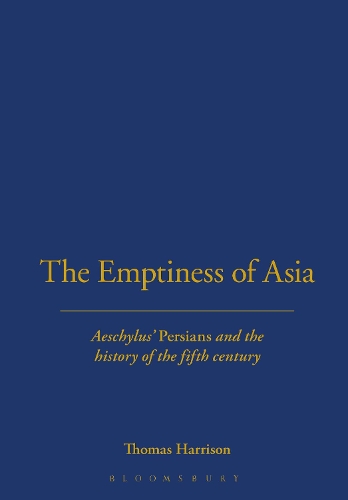
The Emptiness of Asia: Aeschylus' 'Persians' and the History of the Fifth Century
(Paperback)
Publishing Details
The Emptiness of Asia: Aeschylus' 'Persians' and the History of the Fifth Century
By (Author) Dr Thomas Harrison
Bloomsbury Publishing PLC
Bloomsbury Academic
2nd May 2019
United Kingdom
Classifications
Tertiary Education
Non Fiction
Literary studies: ancient, classical and medieval
882.0109
Physical Properties
Paperback
192
Width 154mm, Height 232mm, Spine 12mm
300g
Description
This is a literary study of Aeschylus' Persians alongside Herodotus' Histories, which offers a comprehensive understanding what actually happened at the battle of Salamis and afterwards. Thomas Harrison examines the political and ideological motivating factors underpinning Persai in the context of the times.
Aeschylus Persians is not only the first surviving Greek drama. It is also the only tragedy to take for its subject historical rather than mythical events: the repulse of the army of Xerxes at Salamis in 480 B.C. It has frequently been mined for information on the tactics of Salamis or the Greeks knowledge of Persian names or institutions, but it also has a broader value, one that has not often been realised. What does it tell us about Greek representations of Persia, or of the Athenians self-image What can we glean from it of the politics of early fifth-century Athens, or of the Athenians conception of their empire How, if at all, can such questions be approached without doing violence to the Persians as a drama What are the implications of the play for the nature of tragedy
Reviews
[This] is a literary study of Aeschylus' Persai alongside Herodotus' Histories which will provide the reader with comprehensive understanding what actually happened at the battle of Salamis and afterwards. A scholarly dissection of political and ideological motivating factors underpinning the Persai in the context of the times, The Emptiness of Asia is a fascinating and thoughtfully insightful analysis -- and a welcome addition to Hellenic Studies reference collections and supplemental reading lists. -- The Midwest Book Review
This is a vigorous and captivating book with a mighty sting in its tail. Tom Harrison does what many have done before, he reads Aeschylus Persai alongside Herodotus Histories. But...he compares them to reveal the commonplaces and assumptions about Persia that shaped not only the writing of the play, but the reactions of the audiences. The powerful account of the plays political and ideological force that results overturns a century of modern scholarship, unmasking the projections of their own views that literary critics have wished upon the play and questioning our romantic assertion of the uniqueness of classical Athenian culture. -- Robin Osborne
Author Bio
Thomas Harrison is Professor of Ancient History at the University of St Andrews, UK. His publications include Divinity and History: the religion of Herodotus (2000), and as editor Greeks and Barbarians (2002) and the Edinburgh Companion to Ancient Greece and Rome (2006).
